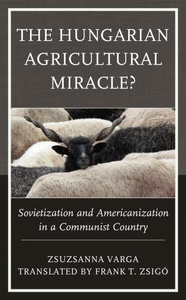RHN 100/2021 | Publication
Zsuzsanna Varga, The Hungarian Agricultural Miracle? Sovietization and Americanization in a Communist Country, Lanham: Lexington Books 2021.
Abundance or shortage in food supply has been a fateful and strategic issue throughout human history. This was no less true in the post-1945 period, when food played a decisive role alongside weapons and ideologies in the competition between capitalism and socialism. In socialist Eastern Europe, queuing for food was the everyday experience everywhere – except Hungary. There, forced agricultural collectivization had been a major factor triggering the 1956 revolution. In consequence, the new post-1956 political leadership was persuaded to learn from the peasants in order to make collective farms workable. An ’agrarian lobby’ emerged which was able to transform peasant initiatives from below into policies which gradually turned Hungarian collective farms away from the Soviet kolkhoz. Later it also convinced the leadership to open up to the West and even permit the transfer of knowledge and technology. The result was the ’Hungarian agricultural miracle’, a successful hybrid of American technology and socialist structures. Zsuzsanna Varga was one of the first to gain access to previously secret archives, and to interview both top politicians and professional practitioners, so giving her analysis of ’sovietization’ and ’americanization’ unrivalled nuance and depth. Her analysis also offers general lessons for economic transfers between countries with different political systems.
Source: Rowman & Littlefield
